ISSUE NO. 37: WHAT THE “S”? PART THREE – COMPANY APPROACHES TO DIVERSITY, EQUITY & INCLUSION (DEI)
In our previous posts exploring the social aspects of ESG, we have discussed the accelerating importance of “S” to investors, customers, workforce and local communities (see part one) and had a deeper look at strategic value creation (see part two). This post explores how approaches to workforce social performance (SP), and in particular DEI, are a critical element of company success.
By Amy Mifflin, SP and DEI Specialist, Geosyntec Consultants, Inc.; and Andrew Buchman, Acorn International
Amidst a global pandemic came upheaval and protests focused on racial and social injustice in America.
The impacts from these protests quickly and emphatically caught the attention of many companies around the world. Businesses in all industries took a stand through statements denouncing the behaviors of police officers while vowing to create (or increase) awareness and education in their workplaces that strengthened just, fair and equitable treatment and inclusion of all its current (and future) employees.
Statements and declarations such as these do matter. However, actions that create and sustain impactful change matter more.
WHAT CAN BE DONE TO IMPROVE DIVERSITY, EQUITY & INCLUSION WITHIN YOUR WORKFORCE?
Businesses that strive to cultivate awareness, understanding and an appreciation of the value of diversity through active participation and engagement with their employees empower the emergence of more productive attitudes and behaviors – not just within the workforce, but for the business overall. For those companies ahead on this journey as well as those just beginning, the events of 2020 signaled the need, and efficacy, of doing more at the behest of their employees and their customers in the arena of diversity, equity and inclusion (DEI). In particular, companies striving to create or preserve value have been catalyzed to generate more opportunities to cultivate awareness, mindfulness and insight.
TABLE 1: DEI AND VALUE-CREATING APPROACHES
As companies begin to evaluate their status with regards to workforce and DEI, it will remain important to consider the impacts that occur externally, in order to tie back and align with policy and practice regarding supply chain, customers, and investors. Combined, these form a company’s ESG ecosystem’ and allow, through ESG mindfulness and planning, for a company to contribute to addressing broader societal challenges, such as:
- Elimination of violence and oppression, whether subtle or overt;
- Alleviation of poverty, including access to clean water and healthcare;
- Promotion of environmental justice and sustainability; and
- The diminution of inequality
We have heard for decades that companies who build and sustain inclusive and diverse workforces will have a competitive advantage among their peers. Investors are now, increasingly, ‘buying in’ to this advantage. Demands for better performance reporting have generated data pointing to the positive correlations of social justice indicators, including diversity and inclusion factors, with corporate performance.
Emerging goals that proactive, DEI and social justice-oriented companies are considering include:
- Making declarations of empowerment for people inside and outside of the workplace; and
- Moving beyond declarations to action, by quickly assessing gaps, and looking to learn what other companies are doing (benchmarking) to address these and other DEI challenges,
- Being responsive to the full spectrum of ‘human diversity’, where no one is marginalized;
- Making a commitment to continued engagement, respectful interactions, and growth that addresses the complexities of the places in which they do business;
- Embracing challenges and recognition that each of its employees have the responsibility to create and manage a just and empowering workplace culture;
- Conducting performance audits on how they attract, retain, hire, promote and reward employees and executives, including boards of directors;
- Maintaining a discrimination-free workplace environment; and
- Encouraging and supporting employees who identify and speak out against discrimination and exclusionary practices (i.e., formal and informal policies and practices that reside within the business.)
Data quality and availability for DEI trends can create obstacles in reporting and transparency. However, this should not deter companies from determining their key materiality issues with regards to DEI and social justice. After all, why risk losing potential benefits gained in productivity and profitability growth, consumer loyalty and satisfaction, talent retention, and increased firm value that flow from valuing and promoting the increasingly important power of diversity within an organization?
News & Notes

Acorn International
1702 Taylor St, Suite 200B
Houston, TX 77007, USA
1213 Purchase St
New Bedford, MA 02740, USA
